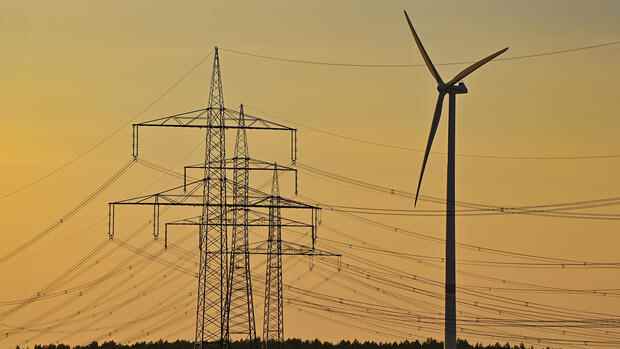Berlin, Dusseldorf The energy industry is vehemently discussing the federal government’s plan to skim off excess profits. Associations and representatives of companies such as RWE, EnBW and others have been warning of falling investments in renewable energies for days. However, many players in the wind and solar industry see things completely differently – and a new study agrees with them for the most part.
According to the energy market consultancy Aurora Energy Research, the planned skimming off of excess profits could result in “significant losses of income” of between 32 and 55 percent in the short term. But: “This has hardly any effect on the long-term profitability of the systems, whether subsidized or not,” emphasizes the main author of the study, Lars Jerrentrup.
“On the one hand, the period in which the levy takes effect is manageably short, and on the other hand, the upper limits are set and provided with safety margins so that the systems remain profitable,” says Jerrentrup. In fact, the high electricity prices even ensured that the expansion of renewable energies in Germany paid off for the first time without large-scale subsidies.
Top jobs of the day
Find the best jobs now and
be notified by email.
This is exactly the argument of some medium-sized developers and operators who see no economic risk in skimming off profits. After all, you made good money last year. Industry insiders speak of very different case scenarios that led to major differences in the profitability of the wind farms. For example, financial investors bought wind farms at very high prices. This is now taking revenge, because the planned revenue caps could put such projects in difficult waters. But that doesn’t apply to other parks at all.
“Wind and solar park operators are among the war profiteers, but coal and nuclear power producers are even more so, alongside oil and gas producers. And now they’re all whining, and while their pockets are overflowing, they’re trying to convince the public that the energy transition is in danger,” says Konrad Grevenkamp, co-owner of a large wind farm.
High electricity prices bring energy companies high profits
In fact, solar and wind power companies make big profits. The wind farm operator Encavis presented figures for the third quarter on Tuesday. Within the first nine months, the Hamburg company made an adjusted profit of 87 million euros, significantly more than the 58 million euros in the same period last year. According to CFO Christoph Husmann, more than half of the higher income is due to the rise in electricity prices.
But they pose major challenges for the economy and society, and more and more citizens are having problems paying their energy bills.
Profit skimming should bring 30 billion euros for the electricity price brake
Where electricity was traded for 30 or 40 euros per megawatt hour for many years, some producers collected between 400 and 600 euros this year. Currently, the price has calmed down again at a significantly lower level. On Tuesday, a megawatt hour of electricity still cost over 140 euros in daily trading – an increase of 250 percent.
The federal government is therefore planning an electricity price brake. In order to finance it, it wants to skim off 90 percent of the income that exceeds certain limits from the producers. Expected revenue: 30 billion euros.
Despite their increased income, wind and solar park operators fear that investments in renewables will be slowed down. According to industry participants, the prices for the systems have risen massively due to inflation, as have the construction and personnel costs and interest on loans. Encavis CFO Husmann criticizes: “Something has to compensate for that. For example due to higher electricity prices. But they will now be cut.”
The first green electricity producers are already reporting on projects that they have temporarily paused or scrapped altogether. The uncertainty as to whether the investment is still worthwhile is too great.
Uncertainty from market intervention is the biggest concern
The experts at Aurora Energy also see the greatest danger from the planned profit skimming in the uncertainty of market participants. The planned massive intervention in the electricity market will lead to a loss of confidence among those involved. Mainly because it is not clear whether the measure might even be extended – a fact that the renewables industry has also sharply criticized. According to the authors of the study, this “could have a negative impact on investors’ risk assessment and thus on their willingness to finance in the long term”.
>> Read here: Excess Profits – The federal government creates a bureaucracy monster
Manager Julia Padberg from the European investor group Set Ventures also considers this danger to be quite real: “Investments in the expansion of renewable energies are the only sustainable solution to the problem of high energy prices.”
Investments in renewable energy have only been recovering for a few years after falling by more than 30 percent from 2017 to 2019.
Last year, 13.3 billion euros were invested in the expansion of sustainable energy systems in Germany, more than in three years. However, it is difficult to predict how the increased costs will now affect the investment climate.
Energy transition: The bureaucratic dangers
In any case, wind park shareholder Konrad Grevenkamp does not see the reason for the lack of investment in skimming off profits. “The energy transition is in danger because the federal states have too few areas, because the permits take far too long, the regulations are too inconsistent, the material costs are rising and the shortage of skilled workers has long been noticeable.”
In fact, the expansion figures for onshore wind power stagnated in the first half of the year. In the case of solar power, the numbers are going up significantly, but the declared goal of 22 gigawatts per year is still a long way off here.
More: Energy industry considers earlier start of the electricity and gas price brake impossible
